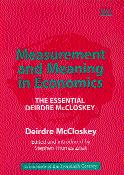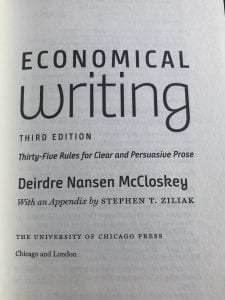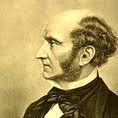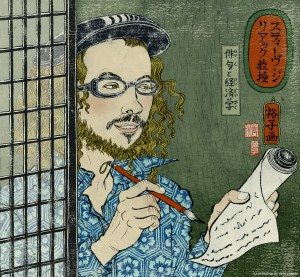Articles, books, reviews, and interviews on writing, rhetoric, and philosophy of economics by Stephen T. Ziliak
- Searching for a fast and effective way to write, revise, and even grade papers? With you in mind I’ve invented the “McZ#” method, now published in the Third Edition of Deirdre McCloskey’s Economical Writing (University of Chicago Press, 2019)
- And here’s a book of economic history and rhetoric you’ll regret not reading at a younger age:
Edited by Stephen T. Ziliak, Measurement and Meaning in Economics: The Essential Deirdre McCloskey(Edward Elgar, 2001, Economists of the Twentieth Century Series)
 A collection of the writings of Deirdre McCloskey, from 1970 to 2000, on economic history and the rhetoric of economics. The collection shows McCloskey’s evolution over time: from economist to critic, positivist to postmodernist, conventional economist to feminist economist, man to woman. Measurement and Meaning in Economics allows the reader to experience an astonishing personal and intellectual journey with one of today’s most fascinating economists.
A collection of the writings of Deirdre McCloskey, from 1970 to 2000, on economic history and the rhetoric of economics. The collection shows McCloskey’s evolution over time: from economist to critic, positivist to postmodernist, conventional economist to feminist economist, man to woman. Measurement and Meaning in Economics allows the reader to experience an astonishing personal and intellectual journey with one of today’s most fascinating economists.
Contents: Introduction: D.N. McCloskey and the Rhetoric of Scientific Economics (by S.T. Ziliak; pp. ix-xxvi); Preface: Personal Knowledge; Part I: Writing Historical Economics as if Measurement Mattered; Part II: Writing Economics and History as if Meaning Mattered (including McCloskey and Ziliak The Standard Error of Regressions JEL 1996 [Chp. 16]); Index
Career Fun Fact In 2003 Ziliak, a PhD economist who also holds a PhD Certificate in Rhetoric, was offered a tenure-track job as Assistant Professor of Rhetoric at the City University of New York (CUNY), Baruch College
Undergraduate Economics Textbook and Blog by Arjo Klamer, Deirdre N. McCloskey, and Stephen T. Ziliak (forthcoming):
The Economic Conversation A pluralistic introduction to micro and macro, in 35 chapters, by the leading rhetoricians of economics
Preview the book here: Is there life after Samuelson‘s Economics? Changing the Textbooks, real world economics review, no. 42, (May 2007): 2-7. By Arjo Klamer, Deirdre McCloskey, and Stephen Ziliak
Other Ziliak Articles & Essays on Rhetoric
Here are three chapters by Stephen T. Ziliak on the rhetoric and philosophy of the social sciences, published in the International Encyclopedia of the Social Sciences (Second Edition, 2006), William A. Darity, Jr. General Editor:
Positive Social Science_Ziliak entry_International Encylopedia of the Social Sciences
Normative Social Science Ziliak entry International Encyclopedia of the Social Sciences
Rhetoric of Social Sciences Ziliak entry IESS 2007
 Read Ziliak’s biographical essay on Deirdre N. McCloskey, published in The Elgar Companion to the Chicago School of Economics (Elgar,2007), Ed. Ross Emmett:
Read Ziliak’s biographical essay on Deirdre N. McCloskey, published in The Elgar Companion to the Chicago School of Economics (Elgar,2007), Ed. Ross Emmett:
Deirdre McCloskey bio Stephen Ziliak Chicago School of Economics Emmett book
And don’t forget these classics:
Pauper Fiction in Economic Science: Paupers in Almshouses and the Odd Fit of Oliver Twist, Review of Social Economy 55 (2, June 2002), pp. 159-181.
*Winner of the Helen Potter Award for “Best Article in Social Economics”, 2002, Association for Social Economics.
Economic History and the Rebirth of Respectable Characters, real world economics review (December 2002). www.paecon.net; Reprinted: E. Fullbrook, ed., Real World Economics, Anthem Press, 2007.
* Cited by real world economics as one of the “Important Texts” of the Real World Economics Movement, www.paecon.net
What are Models for? [Review of Morgan’s and Morrison’s Models as Mediators: Perspectives on Natural and Social Science], in Warren J. Samuels and Jeff E. Biddle, eds., Research in the History of Economic Thought and Methodology 19-A (Elsevier Press, 2001), pp. 149-159.
Freedom to Exchange and the Rhetoric of Economic Correctness. [Review of James Aune’s Selling the Free Market: The Rhetoric of Economic Correctness], in Warren J. Samuels and Jeff E. Biddle, eds., Research in the History of Economic Thought and Methodology 21-A (Elsevier Press, 2003), pp. 331-41.
Palimpsest and The New Economic Methodology [Review of Wade Hands’s Reflection Without Rules] in Warren J. Samuels and Jeff E. Biddle, eds., Research in the History of Economic Thought and Methodology 21-A (Elsevier Press, 2003), pp. 194-207.
The Significance of the Economics Research Paper. In Edward Fullbrook, ed., A Guide to What’s Wrong with Economics (Anthem Press 2004), Chp. 21, pp. 223-236.
Verses of Economy (with Steve Kolowich), Chronicle of Higher Education 55, Issue 37 (May 22, 2009), p. A6.
Review of Tony Lawson‘s Reorienting Economics, Journal of Socio-Economics (2008).
Review of Hugo A. Keuzenkamp‘s Probability, Econometrics, and Truth: The Methodology of Econometrics (Cambridge: Cambridge University Press, 2000), Journal of Economic History 61 (2, June 2001), pp. 578-80.
Ziliak articles and interviews on poetry and economics:
My idea of putting the principles of economics together with the principles of haiku was for the mutual study and benefit of both arts and sciences. Haiku economics was controversial at first, even bizarre, some said. The economists were initially skeptical (I am being generous) but students took to “haiku economics” almost instantly. In fact in 2002, and again in 2003, students at Georgia Tech surprised me with – as Steve Levitt has kindly noted at Freakonomics – two big teaching prizes and poems of their own.
Bashō himself would not be surprised, or so I’ve argued. I tell the story in an essay, “Haiku Economics: Money, Metaphor, and the Invisible Hand,” which I published in 2011 in Poetry magazine. According to the editors of Poetry, my essay was one of the most-read articles in 2011, and is now the most-read article they’ve published in “The View from Here” column. I can’t complain given that previous contributors include Richard Rorty, Christopher Hitchens, Lynda Barry, Neko Case, and the legendary basketball coach and poet, John Wooden (yes, he was a poet).
The first publication of “Haiku Economics” appeared in 2002, in the journal Rethinking Marxism, which was then edited by David Ruccio, Stephen Cullenberg, and Jack Amariglio. (I did not mean to misspell Alan Greenspan’s name; my apologies. But at least the syllable count is the same!) In 2005 I published in the same journal, Haiku Economics No. 2. It wasn’t my best work. But I was inventing something, after all, and invention takes time. A few years later, as I was writing the essay for Poetry magazine, I found comfort in the following haiku (Ziliak, Poetry 197 (4), p. 315):
Window reflection- The baby sparrow sitting, Listening to glass.
To learn more about the history, theory, and practice of haiku economics, the best place to start is an article called “Haiku Economics: Little Teaching Aids for Big Economic Pluralists” which was published in 2009 in the International Journal of Pluralism and Economics Education.
If you’re curious about haiku economics dialogue – how to speak economics in haiku form – check out a piece I did with Steve Kolowich and The Chronicle of Higher Education, “Verses of Economy” (2009).
Here’s a small sample of other reactions I’ve gotten to the increasingly popular art form:
Mary Pilon, Wall Street Journal (and here)
More Intelligent Life (The Economist)
NPR, Planet Money Blog (Chana Joffe-Walt)
NPR, “On Point” (Tom Ashcroft)
Editors, Poetry magazine (Christian Wiman and Don Share)
Poetry Foundation, Harriet Blog
Tim Harford (and here)
Erica Alini, Wall Street Journal
Freakonomics (and here)
The Atlantic (Andrew Sullivan “Daily Dish”)
Better Living through Beowulf (Robin Bates)






